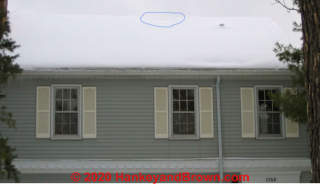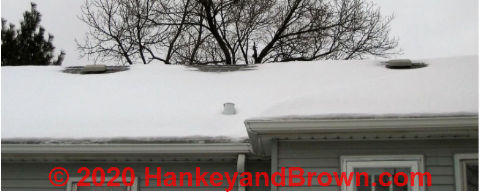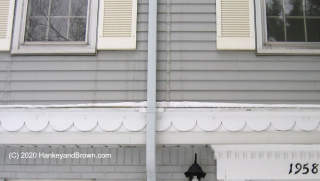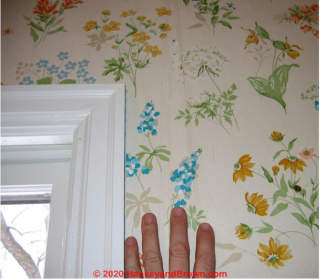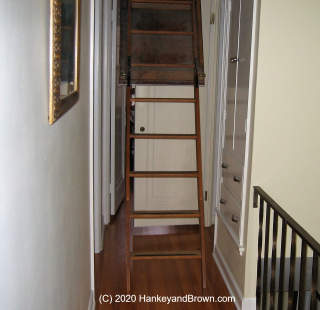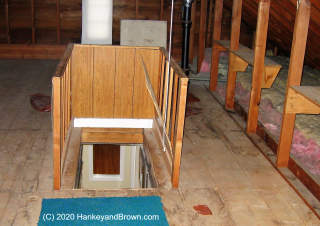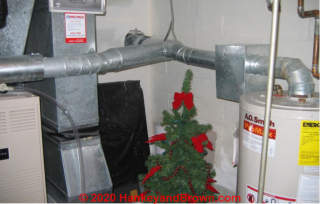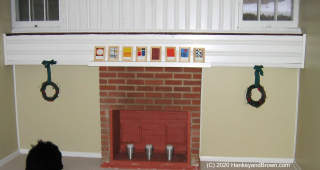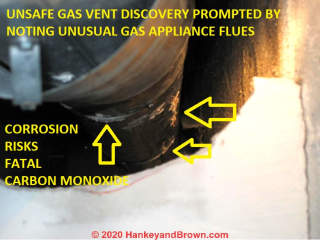 Unexpected Safety Findings
Unexpected Safety Findings
Inspection surprises prove need for breadth
- POST a QUESTION or COMMENT about the scope of a professional building inspection
Roger Hankey's description of unexpected finding of an unsafe gas appliance vent illustrates the importance of examining a building with sufficient breadth & depth.
InspectAPedia tolerates no conflicts of interest. We have no relationship with advertisers, products, or services discussed at this website.
- Daniel Friedman, Publisher/Editor/Author - See WHO ARE WE?
Unexpected inspection findings
Ice Dam Consultation leads to Important Discovery of Dangerous HVAC Vent
Consultations on home owner concerns are a frequent sideline of my inspection services. These consultations are often moisture investigations, several of which have been discussed in articles in the ASHI Reporter under the title of Moisture Mysteries.
Many Minnesota homes develop ice dams in snowy winters and I typically do several consultations on ice dams during those winters.
February of 2004 was a particularly snowy season.
[Click to enlarge any image]
The roof of this 2 story house had a thick blanket of snow except for a dimple in the snow at front near the ridge.
There also were bare spots at the center of the rear roof ridge and at the ventilators at the rear ridge.
The ice dam had caused a leak behind the front gutter which produced a line of ice down the front wall.
The wall paper on the second-floor front bedrooms had stain streaks around the windows.
Investigating the cause of the ice dam was quite simple and direct. Opening the attic hatch revealed a poorly weather stripped and uninsulated stair hatch.
There also was no insulated cover above the folding stair hatch.
The rest of the attic was moderately well insulated. The snow melt pattern on the roof confirmed that the primary cause of the ice dam was consistent with a major heat loss centered in the attic, directly above the uninsulated folding stair.
The consultation report recommended corrections by a qualified insulation contractor and the suggestion that attic storage be eliminated in favor of more insulation over the floored area of the attic.
Just to be certain that other factors such as an air leak into the attic around the cast iron plumbing stack were not contributing to heat loss in the attic, I went to the basement to look for gaps around the pipe where it penetrated the subfloor.
No gaps were found around the cast iron pipe; HOWEVER, the configuration of the furnace and water heater vents were not typical.
Use of a box style horizontal draft hood on the water heater vent is rare. Further, the common vent serving the furnace and water heater passed through a wall and was not readily visible on the other side of the wall.
My first thought was, “this looks strange, keep looking!” The room on the other side of the wall had a faux fireplace in the space in front of the chimney cleanout doors. The mantle over this faux fireplace was a long wooden box at the same height as the vent penetration of the right-side wall.
A close look at the wall penetration revealed that the vent enters this white painted wood faux mantel.
Shining a light into the wall opening revealed that the vent was rusted out along about two feet of its length before entering the chimney.
The corrosion is consistent with condensation due to poor draft in the vent caused by the size, length, inadequate slope, and its connection to a cold exterior chimney.
Since the consultation was done for the home seller as an ice dam investigation, not a full home inspection, the adverse venting condition was reported separately in an email, and not included in the consultation report. The email recommended immediate correction of the venting system to reduce the potential for carbon monoxide entry into the house from the furnace or water heater.
Watch out: The lesson from this case is that even when the cause of an adverse condition such as an ice dam is readily diagnosed, a proper investigation must include an overview of other related systems or components.
Examination of the heating system venting is not necessarily within the scope of an ice dam investigation. However, failure to examine and report the rusted-out vent could lead to a claim of negligence, particularly if combustion products (such as the potential for carbon monoxide) spilled from the vent into the house.
If you do moisture investigations or other consultations as part of your inspection services, please consult your attorney to develop a contract or consultation agreement that addresses how conditions outside the of scope of work will be handled, and how to provide good service without increasing your liability. You may want to include compensation terms for out of scope work.
Regardless of the limitations of your agreement, it is unwise to ignore an adverse or atypical condition without taking a closer look. Both you and your customer will be glad you did. You must document your findings, but the customer can decide whether or not the “out of scope” findings are to be included in the consultation report, or reported separately.
---
Roger Hankey is principal of Hankey and Brown Inspections, Winter Park, CO. Mr. Hankey is a past chairman of the ASHI Standards Committee and served in other ASHI chapter and national leadership roles. Mr. Hankey is a National Radon Proficiency Program certified measurement professional and a Level II infrared thermographer. Contact Roger Hankey at: 970-393-6604 - rogerhankey47@gmail.com
. Website: www.HankeyandBrown.com
Mr. Hankey is a frequent contributor to InspectAPedia.com. See AIR HANDLER DUST CONTAMINATION, and BUILDING INSPECTION SURPRISE PROVES NEED for SCOPE, and CONDENSING GAS FURNACE INSPECTION & TESTS, and CORROSION & MOISTURE SOURCES in PANELS, and HEAT RECOVERY VENTILATOR FIRE, and others.
Watch out: A proper standard of practice or home inspection licensing law must require that when the professional inspector finds a substantive deficiency or unsafe condition, she or he must communicate that adequately to the client and for safety items, to others who may be affected such as a building owner or occupant.
...
Continue reading at HOME INSPECTION SCOPE of COVERAGE or select a topic from the closely-related articles below, or see the complete ARTICLE INDEX.
Or see these
Home Inspection Articles for Consumers & Home Inspectors
- ADVANCED INSPECTION METHODS
- B-VENT CHIMNEYS
- CARBON MONOXIDE - CO
- CHIMNEY WET TIME & CORROSION
- DAMPERS & DRAFT REGULATOR TYPES
- FEAR-O-METER: Dan's 3 D's SET REPAIR PRIORITIES a promotion theory to convert risk of hidden defects & hazards into action thresholds
- HOME & BUILDING INSPECTION - home
- HOME INSPECTION, GET THE MOST FROM
- HOUSE DOCTOR, HOW TO BE A
- ROOF ICE DAM LEAKS - home
Suggested citation for this web page
BUILDING INSPECTION SURPRISE PROVES NEED for SCOPE at InspectApedia.com - online encyclopedia of building & environmental inspection, testing, diagnosis, repair, & problem prevention advice.
Or see this
INDEX to RELATED ARTICLES: ARTICLE INDEX to BUILDING & HOME INSPECTION
Or use the SEARCH BOX found below to Ask a Question or Search InspectApedia
Ask a Question or Search InspectApedia
Try the search box just below, or if you prefer, post a question or comment in the Comments box below and we will respond promptly.
Search the InspectApedia website
Note: appearance of your Comment below may be delayed: if your comment contains an image, photograph, web link, or text that looks to the software as if it might be a web link, your posting will appear after it has been approved by a moderator. Apologies for the delay.
Only one image can be added per comment but you can post as many comments, and therefore images, as you like.
You will not receive a notification when a response to your question has been posted.
Please bookmark this page to make it easy for you to check back for our response.
IF above you see "Comment Form is loading comments..." then COMMENT BOX - countable.ca / bawkbox.com IS NOT WORKING.
In any case you are welcome to send an email directly to us at InspectApedia.com at editor@inspectApedia.com
We'll reply to you directly. Please help us help you by noting, in your email, the URL of the InspectApedia page where you wanted to comment.
Citations & References
In addition to any citations in the article above, a full list is available on request.
- John Cranor [Website: /www.house-whisperer.com ] is an ASHI member and a home inspector (The House Whisperer) is located in Glen Allen, VA 23060. He is also a contributor to InspectApedia.com in several technical areas such as plumbing and appliances (dryer vents). Contact Mr. Cranor at 804-873-8534 or by Email: johncranor@verizon.net
- Mark Cramer Inspection Services Mark Cramer, Tampa Florida, Mr. Cramer is a past president of ASHI, the American Society of Home Inspectors and is a Florida home inspector and home inspection educator. Contact Mark Cramer at: 727-595-4211 mark@BestTampaInspector.com 11/06
- Roger Hankey is principal of Hankey and Brown Inspections, Winter Park, CO. Mr. Hankey is a past chairman of the ASHI Standards Committee and served in other ASHI chapter and national leadership roles. Mr. Hankey is a National Radon Proficiency Program certified measurement professional and a Level II infrared thermographer. Contact Roger Hankey at: 970-393-6604 - rogerhankey47@gmail.com . Website: www.HankeyandBrown.com Mr. Hankey is a frequent contributor to InspectAPedia.com.
- Our recommended books about building & mechanical systems design, inspection, problem diagnosis, and repair, and about indoor environment and IAQ testing, diagnosis, and cleanup are at the InspectAPedia Bookstore. Also see our Book Reviews - InspectAPedia.
- [ASHI Headquarters Website]
- Building Pathology, Deterioration, Diagnostics, and Intervention, Samuel Y. Harris, P.E., AIA, Esq., ISBN 0-471-33172-4, John Wiley & Sons, 2001 [General building science-DF] ISBN-10: 0471331724 ISBN-13: 978-0471331728
- Building Pathology: Principles and Practice, David Watt, Wiley-Blackwell; 2 edition (March 7, 2008) ISBN-10: 1405161035 ISBN-13: 978-1405161039
- In addition to citations & references found in this article, see the research citations given at the end of the related articles found at our suggested
CONTINUE READING or RECOMMENDED ARTICLES.
- Carson, Dunlop & Associates Ltd., 120 Carlton Street Suite 407, Toronto ON M5A 4K2. Tel: (416) 964-9415 1-800-268-7070 Email: info@carsondunlop.com. Alan Carson is a past president of ASHI, the American Society of Home Inspectors.
Thanks to Alan Carson and Bob Dunlop, for permission for InspectAPedia to use text excerpts from The HOME REFERENCE BOOK - the Encyclopedia of Homes and to use illustrations from The ILLUSTRATED HOME .
Carson Dunlop Associates provides extensive home inspection education and report writing material. In gratitude we provide links to tsome Carson Dunlop Associates products and services.


